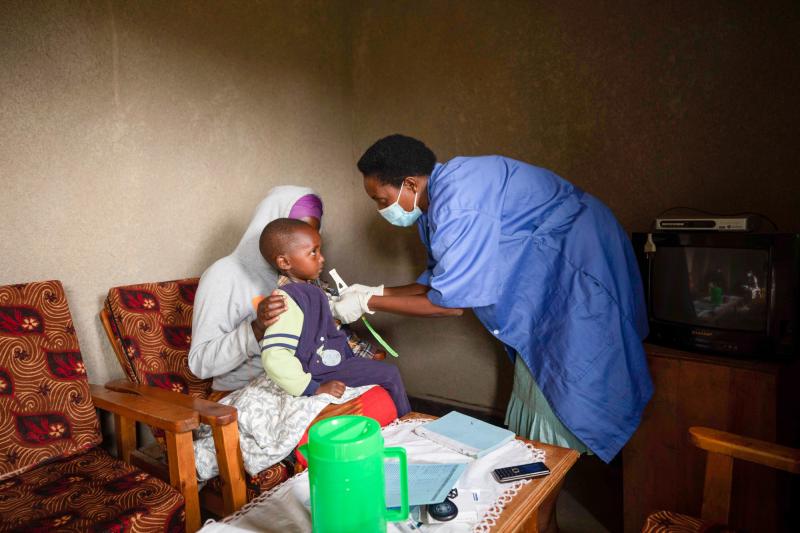Where We Work
See our interactive map


UWIBOHOYE Ruth examines a child during a home visit. Photo by Innocent Ishimwe for IntraHealth International.
A new article, “Using eLearning to improve and retain the knowledge of community health workers in maternal and neonatal health in Rwanda: A cohort study,” published in the journal Public Health Challenges, details the results of a study among Rwandan community health workers (CHWs) participating in a smartphone-based eLearning course. IntraHealth International conducted the study through its USAID-funded Ingobyi Activity, which worked to bring high-quality, integrated health services to more Rwandan mothers, children, and adolescents from 2018-2023.
Read the article here.
CHWs play a critical role in providing community-based maternal and newborn health services in Rwanda but need ongoing training to perform their jobs effectively. IntraHealth collaborated with the Ministry of Health and Rwanda Biomedical Centre and piloted the eLearning activity in two districts comprising 958 villages. Smartphone-based eLearning is intended to create a more independent, cost-effective, and sustainable method of learning for CHWs, complemented with mentorship programs and supportive supervision.
The study, carried out from April-October 2021, evaluated knowledge acquisition and retention among 36 female CHWs participating in the eLearning course. Knowledge scores were measured using a structured questionnaire administered pre-training, post-training, and at a six-month follow-up. Following the eLearning course, CHWs performance scores improved, with an average increase from 86.5% to 98.2%, and with the improvement sustained at the six-month follow-up.
Findings suggest eLearning is an effective method for enhancing and retaining CHWs’ knowledge in maternal and newborn health.
These gains occurred even though all participants reported they had never used a smartphone before the study (many did have feature phones). Locally produced smartphones were procured for participants as part of the study design. The course content covered four key areas: overview of maternal and newborn health, surveying girls and women of childbearing age, conducting home visits for pregnant women, and conducting postnatal care visits.
The study findings suggest that eLearning is an effective method for enhancing and retaining CHWs’ knowledge in maternal and newborn health, and that smartphone-based eLearning can be a valuable strategy to consider for strengthening CHW capacity in Rwanda and other countries.
Current and former IntraHealth staff Yves Sangwa, Victor Ndaruhutse, Jacqueline Umunyana, and Christian Mazimpaka share joint first authorship of the article, which also includes additional co-authors from IntraHealth as well as the University of Rwanda and the Rwanda Biomedical Center.



